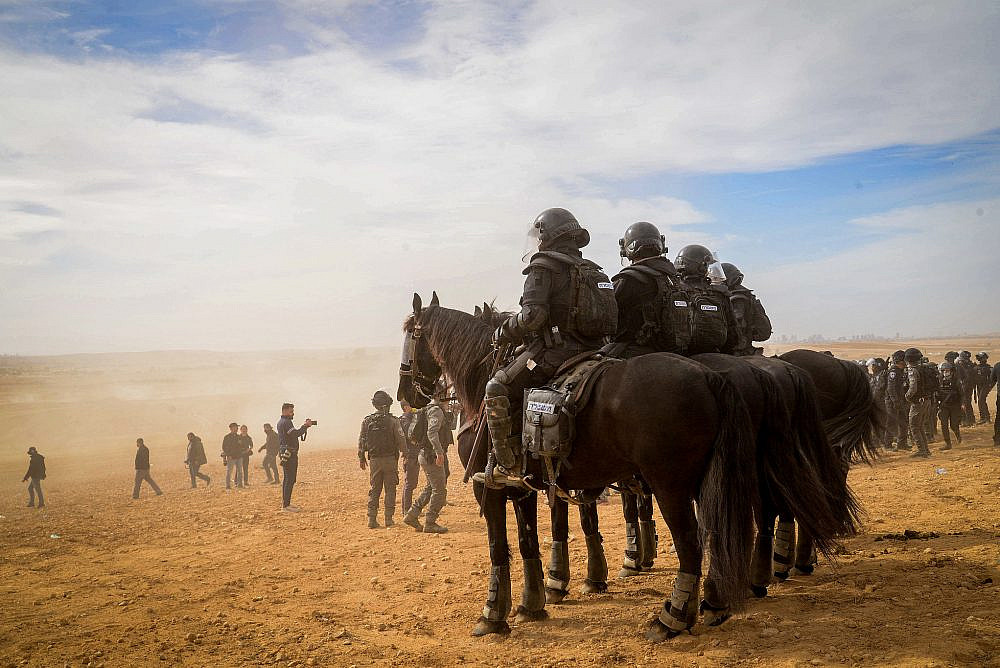This article was published in partnership with Local Call.
Ever since its founding, the State of Israel has used tree planting as a means to either cover up the past or pave the way for the future. While on its face tree planting appears a benign, even positive policy to pursue, in Israel, the story is quite different.
The state has historically planted trees as a way to conceal the Palestinian villages it destroyed — and whose residents it expelled — during the Nakba in 1948. But the practice remains a tool for the further dispossession of Israel’s Palestinian citizens to this day. Nowhere is this more apparent than in the Naqab/Negev, where Israel’s struggle over land against Bedouin citizens is taking the shape of a military operation.
New documents uncovered by Local Call reveal the extent to which the Israeli authorities treat their own citizens as enemies. According to a contract between the Israel Land Authority (ILA), which manages state-owned land, and the Jewish National Fund-Keren Kayemeth LeIsrael (JNF-KKL), a quasi-governmental organization that owns 13 percent of the land in Israel and is responsible for tree-planting projects across the country, Israeli police recommended that the JNF plant forests in territories that the state wants to “protect” from the Bedouin in order to “to prevent invasions and trespassers.”
The plans, according to the contract, are to be kept “secret until their implementation,” while the Bedouin residents, who oppose the planting on land they claim ownership of, are defined as a “criminal [and] hostile population.”
The afforestation itself, the document stipulates, will be carried out by the JNF as a contractor of the ILA, and the land on which the trees will be planted is not assigned to it. The scope of the contract is NIS 15 million for 2022, and NIS 20.5 million for 2023. Notably, the agreement has been exempted from public tender; government institutions in Israel are supposed to issue such tenders for all contracts, unless a decision is specifically made otherwise.
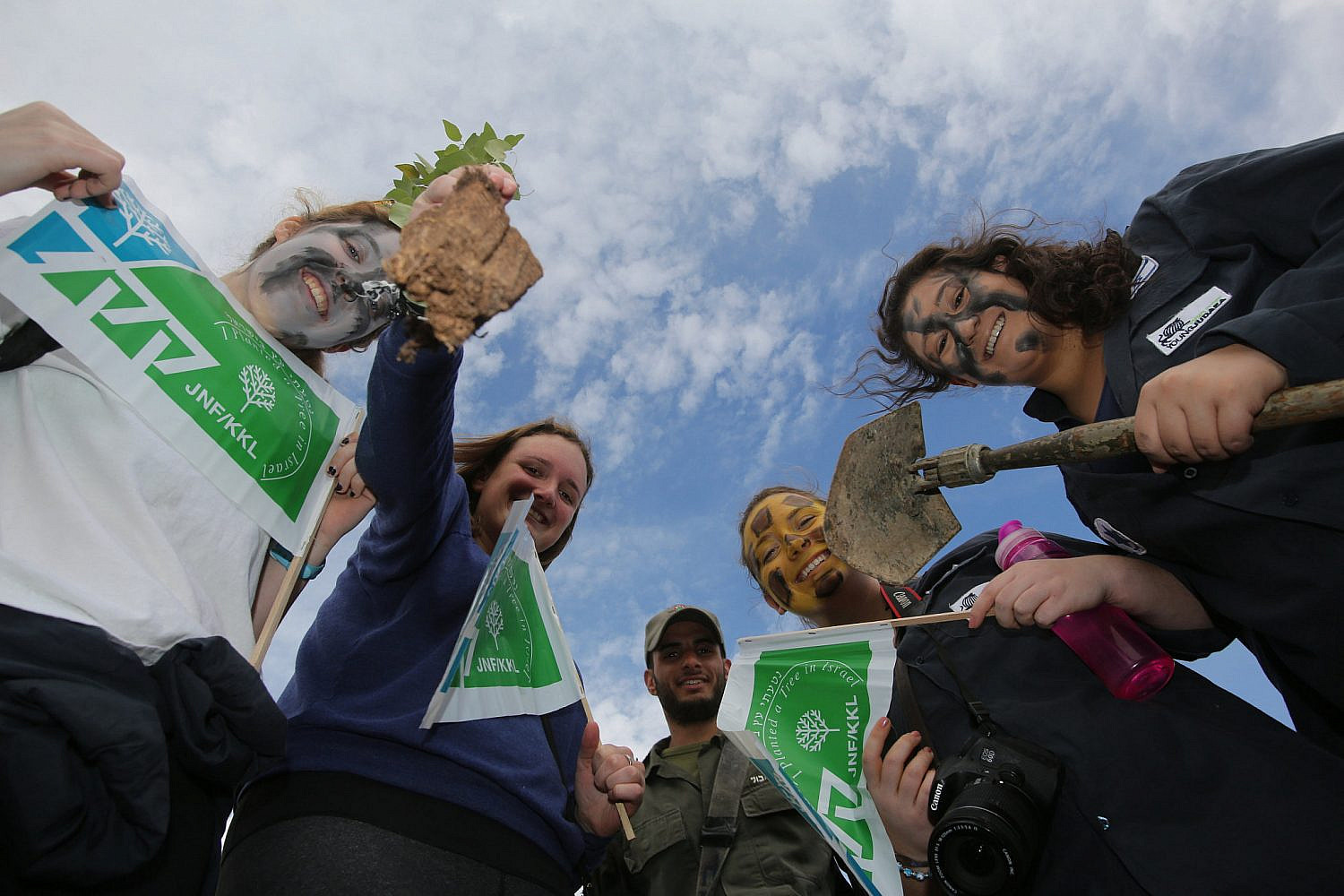
While previous afforestation contracts between the ILA and JNF were justified by the latter’s proficiency in planting forests, this year the militarized language stands out as a major justification. The new agreement explicitly claims that afforestation has proven to be effective at preventing “invasions,” and that saplings are intended to facilitate a “strong capture” of the land.
Furthermore, the agreement states that the location for afforestation was determined after inspectors from the ILA, the Nature and Parks Authority, and the JNF identified “‘sensitive’ areas… [in which] repeated massive invasions take place, characterized by cultivation and illegal construction.”
The militaristic language may be a response to robust protests led by Bedouin residents in the village of Sa’wa al-Atrash in January, after Israeli authorities attempted to carry out afforestation plans on their land.
“This document shows how the state is deliberately operating in the dark,” said attorney Myssana Morany from Adalah, a legal center focused on the rights of Palestinian citizens of Israel. The contract, Morany added, shows that for the state and the police, “planting trees has become a weapon” against the Bedouin population.
‘A criminal population’
The agreement did not specify where the new afforestation will take place, but from data in Adalah’s possession, in addition to data obtained from a previous petition submitted by the Society for the Protection of Nature in Israel, it appears that more than half of the afforestation projects that were carried out for the purpose of land grabs over the last two decades took place in the Naqab. The document also makes no reference to the fact that in many cases, planting is done in territories that are not registered in the name of the state, since Bedouin residents have filed ownership claims for them.
Earlier this year, the JNF tried to plant trees close to the houses of the village of Sa’wa al-Atrash, on land over which the al-Atrash family filed an ownership claim decades ago, and which it cultivated until the moment of the JNF’s planting. Following major protests, police violence, and the arrest of dozens of residents, the planting was halted. Construction and Housing Minister Ze’ev Elkin at the time dismissed the confrontations as a “routine event.”
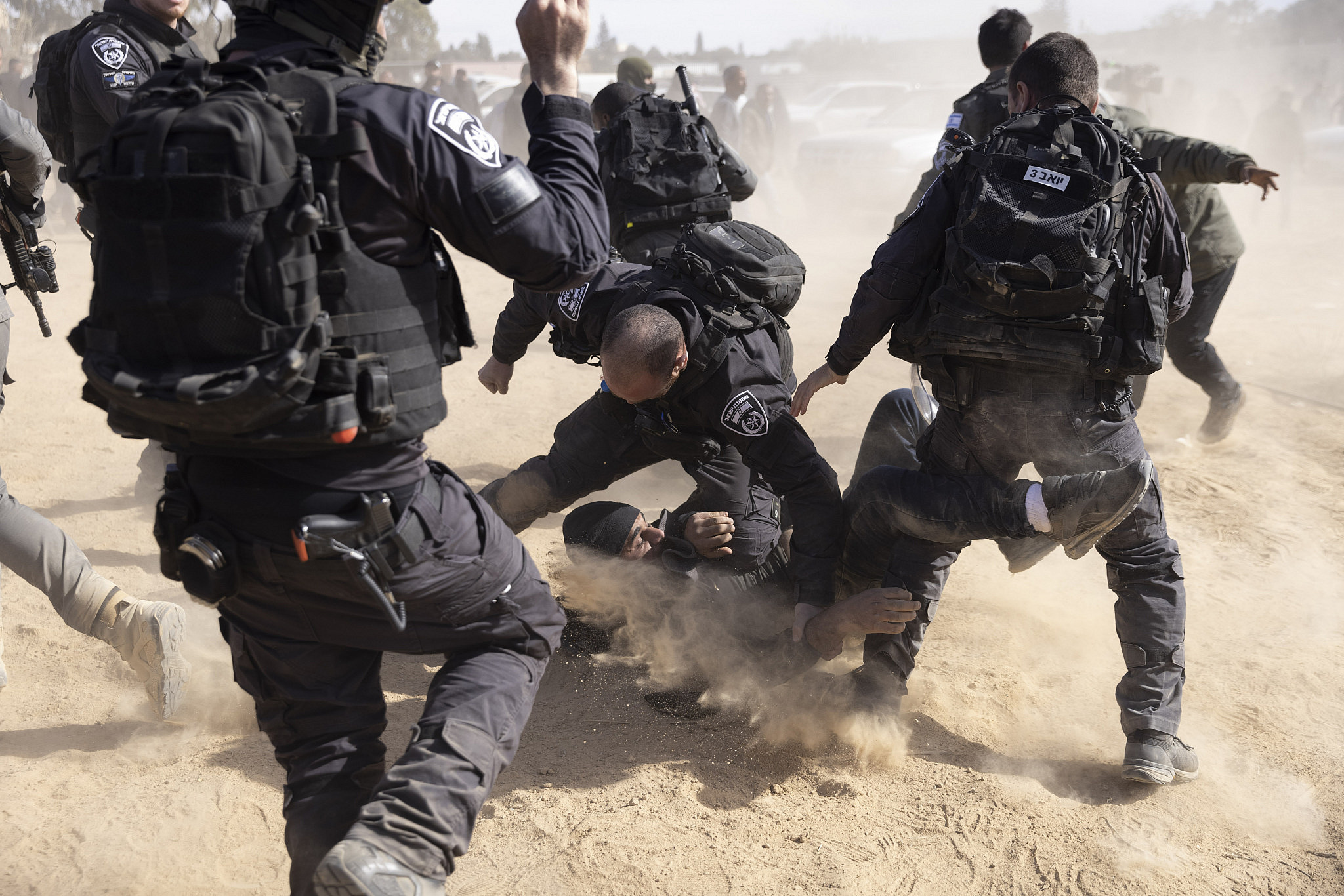
To substantiate the need to partner with the JNF specifically, the contract stated that the ILA “attached to its application a letter from the head of the Israel Police Special Forces Unit and the commander of the Yoav Unit [a paramilitary police unit tasked with enforcement in the Bedouin community] clarifying the necessity and effectiveness of carrying out the afforestation for the purpose of protecting the land, and in particular the need for such operations to be carried out by a public body [i.e. the JNF], which has an advantage by its very purpose and goals in dealing with a criminal population that tries to thwart afforestation.” It is unclear under what authority the police believed it could endorse which agency should carry out the planting of trees.
“The police crossed the line with this recommendation,” said Hussein al-Rifa’a, a social activist who was involved in the struggle in Sa’wa al-Atrash and previously headed the Regional Council of Unrecognized Villages in the Naqab. “It is an enforcement body, not a recommending body, but in the Naqab everything is possible.”
“This is a violation of [the police’s] authority,” echoed Dafna Saporta, coordinator of the Negev team at the planning NGO Bimkom, which works against the ILA and JNF-KKL’s afforestation methods. “What position can the police have on holding land?”
“We are facing a wave of incitement, and the media has been a willing participant,” al-Rifa’a continued. “The Bedouin are not criminals. They want solutions — for 70 years. Like any population that has been neglected by the state, there is a small percentage of negative things: one person commits an illegal act, and the entire community is labeled as ‘criminals.’”
‘Everything is in the same hands’
To explain why the JNF’s contract was exempted from tender even though it is a public body, the agreement states that “there were people who sought to prevent the afforestation [who had] committed damage to property and lives,” adding that “a private contractor motivated by considerations of profit alone will be deterred from working with a hostile population.” The JNF, on the other hand, is “driven by conviction… the determination of JNF-KKL employees and their commitment to the task of protecting the land is great and proven in light of past experience.”
The military atmosphere of the afforestation project “for the purpose of protecting the land” reaches its peak in Section 7.3.3 of the document: “in working with JNF-KKL,” it reads, “the state’s plans are kept secret until their implementation. This matter is of great importance since revealing the operations at an earlier stage could thwart the operation and endanger the forces operating in the field.”
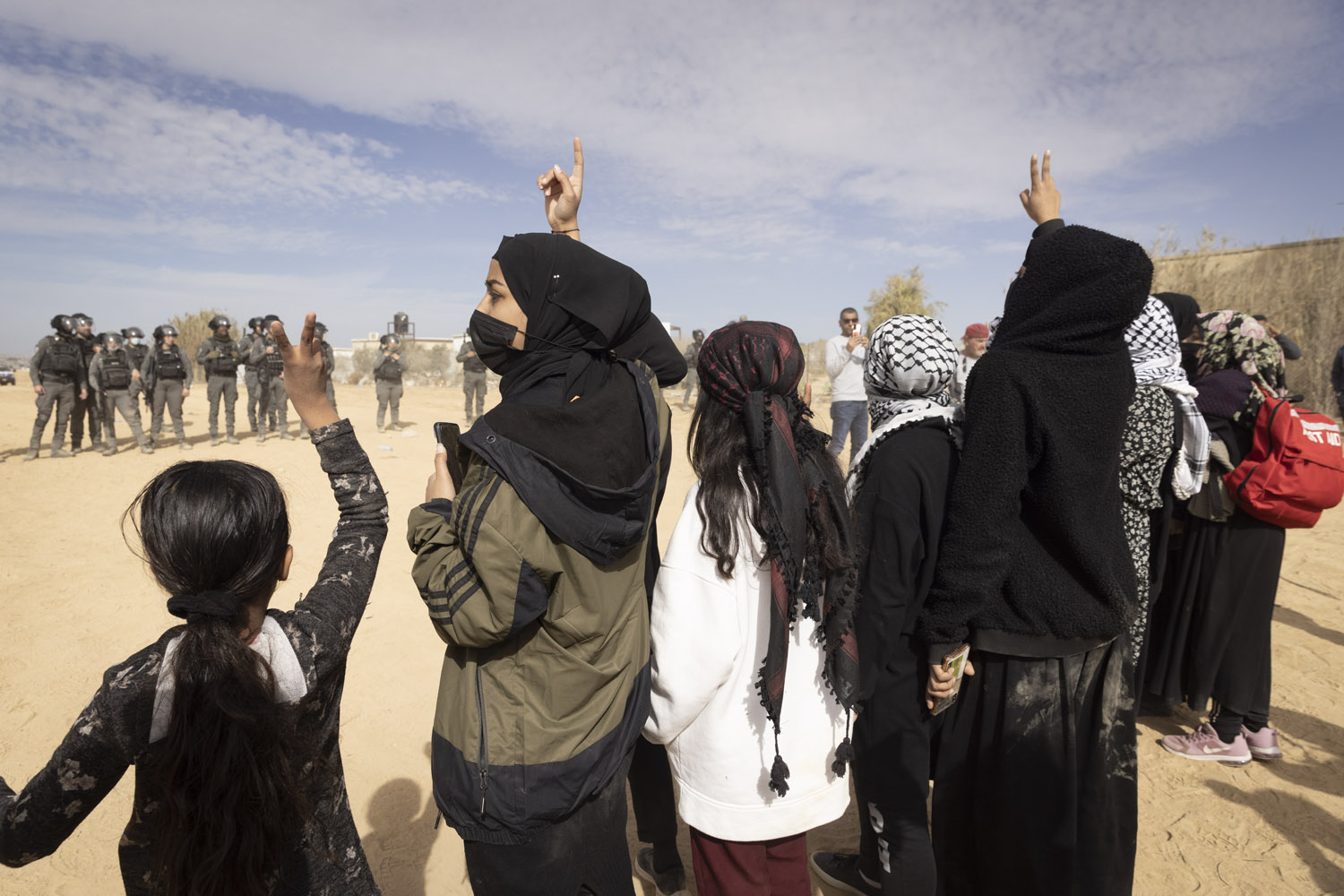
In a 2001 ruling, the Israeli High Court ruled that planting forests should be considered like any other planning act, and must therefore be presented to the proper planning committees where objections can be raised. However, the ILA claims that this is “agricultural afforestation” and does not require approval, thus bypassing the planning committees. Bimkom, as well as other organizations, strongly rejected this definition.
In 2015, the Society for the Protection of Nature in Israel petitioned the High Court against afforestation plans in the Naqab on the grounds that they cause severe damage to nature and illegally bypass accepted planning procedures.
The “Scoop Committee” (named after a top ILA official) was subsequently established to review cases designated as “agricultural afforestation.” But the discussions in this committee — more than half of whose members are representatives of the ILA, JNF, and the Nature and Parks Authority — are not transparent to the public. Another petition filed by the Society for the Protection of Nature in Israel against the afforestation plans was rejected.
In February, Adalah filed a freedom of information request to the ILA to receive the committee’s protocols and other materials related to its work. “We received very few materials,” said Morany. The ILA “told us that some of the materials are in the hands of the JNF, who they approached, but the JNF did not provide them. They suggested I contact the JNF.”
Turning to the JNF is hopeless, Morany said, because it is technically not a governmental body and therefore is not obligated to respond to freedom of information requests. But in light of the document in which the state openly admits it uses the JNF to maintain the secrecy of its afforestation plans, it is now clear, stressed Morany, that “everything is in the same hands. The state transfers to the JNF things it cannot legally do.”
‘We have to survive this wave of incitement’
According to Saporta, it can be assumed that the afforestation plans would have encountered difficulties had they reached the planning committees. “The afforestation is being carried out on territories that the state defined, as part of the Be’er Sheva Metropolitan Plan, as a ‘mixed agricultural rural landscape’; that is, areas intended for the establishment and expansion of Bedouin villages. Afforestation contravenes this plan,” she said.
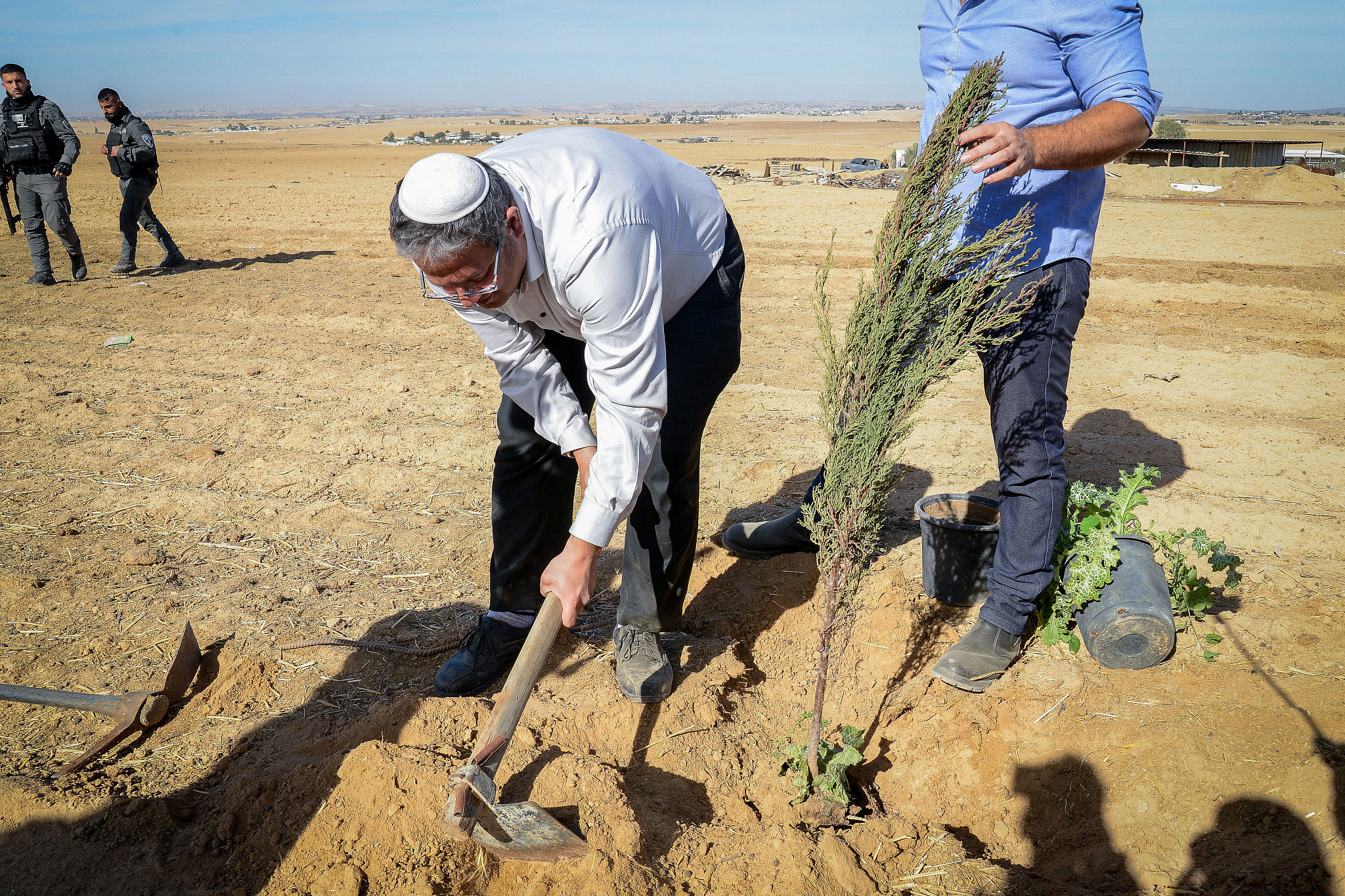
As in Sa’wa, a large part of the planting is in areas very close to the homes of Bedouin residents, which is no accident. In one of the protocols of the Scoop Committee that Adalah received, Ilan Yeshuron, the southern region director of the ILA’s land protection division, says that “the purpose of the planting is, among other things, to prevent the expansion of illegal [Bedouin] settlements in the area. We’re approaching a distance of dozens of meters from the residential clusters, no more.”
Because the ILA and the JNF do not provide data on their afforestation projects, it is difficult to know exactly the extent of their plans, but it is estimated to involve tens of thousands of dunams. According to Adalah, there are ownership claims on a significant portion of the afforested areas, meaning that, contrary to what is described in the ILA-JNF document, the state is not the owner.
“They say the goal is to prevent invasion, but determining who is invading or not is a legal matter,” said Morany. “They are creating facts on the ground. There is no legal inquiry, there is no planning procedure, and there is no transparency.”
The ILA claims that the project is only temporary, and that trees can be uprooted later if the legal situation changes. But this does not reassure Morany. “It’s a bluff,” she explained. “The tree planting prevents people with ownership claims from using the land. They’re changing the situation and bypassing the regularization processes.”
“The court won’t help [the ILA]; these are private Bedouin lands,” said Al-Rifa’a, referring mainly to the Be’er Sheva Valley, where a large portion of the unrecognized villages are located, and where a large part of the afforestation has been carried out. “From a legal perspective, the ownership of the land is not contested. The population was not transferred from another part of the Naqab, but rather has remained there since Israel’s founding.”
He continued: “The state tried to take over this area in all kinds of ways and it didn’t work, so now they want to use the JNF and the police to take over the land. We are in a bad situation, but we have to survive this wave of incitement.”
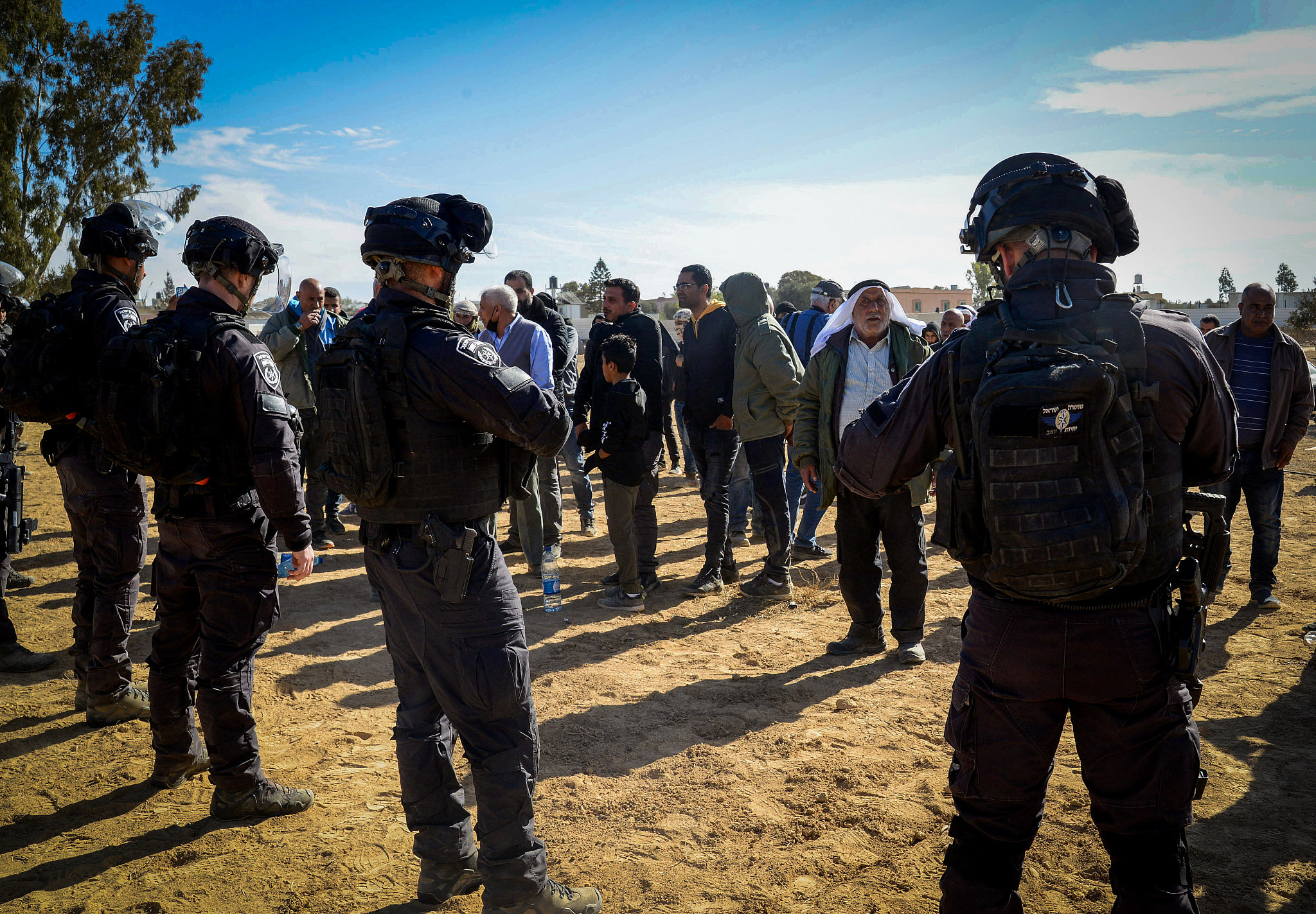
In its response to Local Call’s request for comment, the ILA stated: “Planting operations to protect and preserve land in the Negev have been carried out by the state for about 30 years as part of the ongoing work to protect the state’s lands and as part of the duties of the ILA established by law. These are temporary and reversible agricultural works, the purpose of which is to preserve the land so that it is available for any use determined by the authorized parties.”
It continued: “Many years of experience show that tree planting is highly effective in preventing invasions and illegal construction, as well as preventing major environmental damage as a result of dumping waste and illegal landfills, and conserving runoff water, etc. These protective plantings are carried out in coordination with all the relevant state bodies, following a clear decision of the High Court on the matter.”
Regarding the role of domestic security forces in the plans, the ILA added, “The police is a body that assists the ILA in carrying out the enforcement actions in accordance with the legal powers, and it is not involved at all in the management of the land and all that this implies.”
In its own statement to Local Call, the Israel Police said that its role is to “assist and secure the civilian enforcement bodies in performing their duties, after they have turned to the police of their own initiative for assistance. We emphasize that the police do not interfere in anything related to land management, including the rights to land, in all aspects arising from it.
“The letter in question refers to the difficulties that the enforcement bodies face in enforcing the law, the risks involved, and the benefits of working with a public body in light of the aforementioned circumstances. The statements regarding the benefits of planting as a way to seize possession of land are based on a professional position and extensive experience of Israel Police in assisting the enforcement bodies.”
A version of this article was first published in Hebrew on Local Call. Read it here.
Correction, Sept. 22, 2022: Due to an editing error, an earlier version of this article’s headline described the agreement as “secret.” This has been amended to reflect that while the plans within the agreement were to be kept a secret until their implementation, the contract itself was not a secret.


